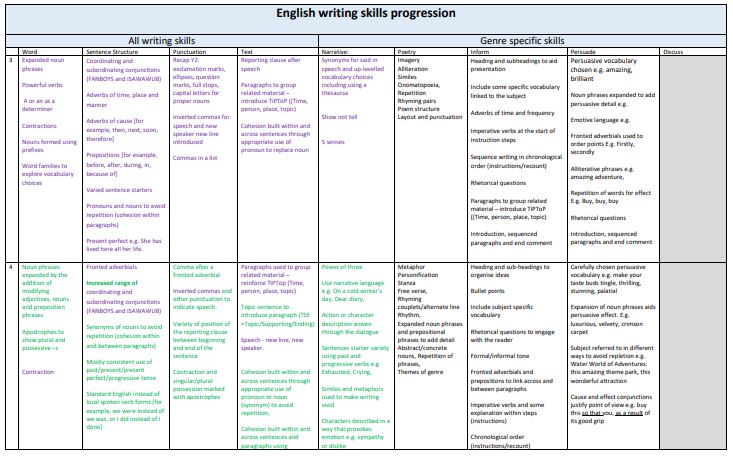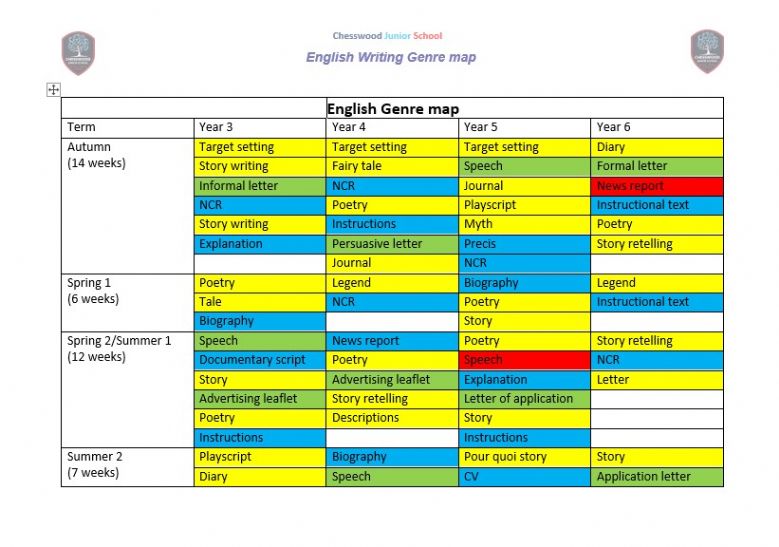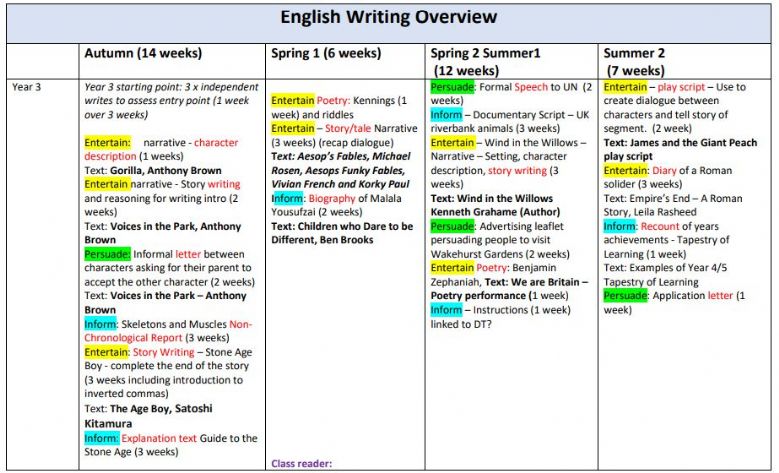English Curriculum Content and Sequence
english Vision
English is at the core of all aspects of learning at Chesswood, and we will equip children with the ability to develop as effective communicators through developing spoken and written skills. Reading and literature is central to the acquisition of knowledge and developing a love of reading, whether through embedding quality texts in writing, shared/guided reading or independent skills, is key. Purpose and audience are central to effective writing and children will be given meaningful reasons to write through which they can communicate their ideas and emotions to others.
english strategy
Reading
•Pupils will be taught to become fluent, confident readers through effective word reading, decoding and word recognition. This will be underpinned by sound phonics knowledge with target interventions delivered to support development of these key skills.
•Pupils will be encouraged to read widely, fiction and non-fiction, through exposure to a wealth of literary experiences within their learning, and available to all through the school library and a cost price bookshop.
•Comprehension skills will be developed though discussion, enabling pupils to retrieve, infer, evaluate and synthesise information contained within rich texts.
Writing
•Pupils will write in real, relevant and engaging contexts, developing an awareness of purpose, form and audience with increasing independence. Rich texts will be used to familiarise pupils with ambitious grammatical structures and imaginative and specific vocabulary. Clear, explicit links will be made to guided reading and, where possible, topic and cross curricular links will add depth and context to writing. The writing will follow a planning, drafting, editing (using workflow) and publishing sequence. Year group non-negotiables and bespoke target cards will be used to reinforce and embed prior learning. Reasoning for writing will encourage pupils to explain and evaluate their structural, grammatical and vocabulary choices.
•Nasty writing will start the vast majority of lessons and will be a focused sentence level task to rehearse a taught skill or address a misconception or weakness.
•Grammar will be taught explicitly and applied to short burst writing to rehearse and embed skills. Teachers will model, and encourage pupils to use, correct grammatical terminology.
•Accurate spelling will be taught through phonics, morphology and orthology with pupils building on letter sounds, rules, patterns and meanings. Spellings will be rehearsed, used in contexts and developed through topic specific word banks. Positive marking will celebrate the correct letters in misspelt words, with bespoke key word lists and target interventions used to support and backfill gaps in spelling words from previous years.
•To facilitate efficient recording of ideas and show pride in their published writing, pupils will be encouraged to develop fluent, legible, speedy handwriting through correct letter formation and the use of leading and joining strokes. Whole class teaching will give way to need-based targeted interventions as pupils move though the school.
•Marking and feedback will be alongside the child to accelerate in-lesson progress, and detailed within the planning for maximum impact including the planning stage and mid-marking. It will be precise and focused on the learning outcomes and bespoke pupil targets and give clear next steps to work on within the writing sequence.
•Regular moderation will be used to check progress and encourage dialogue between teachers to facilitate accurate judgements and share good practice.
Speaking and listening
•Opportunities will be given for pupils to participate in discussions and presentations, articulating and justifying their own opinions, and considering and evaluating different viewpoints.
Oracy, drama and rehearsal opportunities will be promoted across the curriculum to deepen understanding and develop vocabulary and communication skills.
•Pupils will be encouraged to ask questions to extend their knowledge, explore ideas and build their vocabulary.
english principles
In line with the whole school curriculum policy, the following drivers and principles underpin everything we do in English.
Curriculum Drivers
Life Opportunities Creativity, Confidence, Competence
Curriculum Principles
Balanced Coherent Real & Relevant
Knowledge Rich Cognitively Challenging Inclusive
Life Opportunities
English is a key life skill and it underpins access to all learning areas. At Chesswood we aim to develop fluency confident readers that can access a wide range of written material. Our goal of fostering a love of reading which will form the critical foundations through their academic life and on into adulthood. Competent writers are able to communicate with others stimulating action or interest from the reader. In order to achieve this, child must be competent in the core skills of text and grammatical structure, spelling, tone presentation and an awareness of audience. At Chesswood, we are an integral part of the journey towards becoming competent writers who will be able to present themselves effectively and coherently to the necessary audiences in later life.
Creativity Confidence Competence
The English curriculum seeks to build knowledge upon knowledge and skills upon skills, sequencing progression through the school. This seeks to embed competence and confidence within the subject by focusing on core aspects children must achieve to be able to progress. Through metacognition, children will become self-regulated learners aware of their strengths and areas of development. Children will be engaged in exciting writing opportunities, often with cross-curricular links in which they can explore genres and rehearse skills.
Children will access the best of what has been thought and said through immersion in classic and high-quality contemporary literature across fiction and non-fiction genres.
Balanced
Whilst on the Chesswood learning journey, children will access a carefully planned balance between genres: narrative, information, persuasion and discussion. Throughout a writing sequence a balanced range of activities will be offered to children: exploring rich texts; rehearsing technical grammar skill; spelling rules and repartition; short burst writing; planning ideas; drafting writing; editing and proof reading and reasoning for writing.
Coherent
Whilst making links to various other subjects, the place and importance of English is the core focus. Knowledge, skills, concepts and vocabulary in reading and writing are coherently planned and sequenced progressively. There is clarity about what getting better at the subject means with the use of bespoke targets and opportunities to reflect, explain and justify choices.
Real and Relevant
English is rooted in real and relevant experiences for children. Within reading and writing, the core focus is on the application of taught skills and their relevance beyond the school gates. That reading and writing experiences are linked to events and experiences in the real world, both historically and currently, is central to the planning of the subject.
Knowledge Rich
The English curriculum seeks to sequence knowledge effectively, ensuring that children have a good understanding of the key skills:
- Reading fluency, vocabulary and comprehension
- Writing process, grammar, spelling,
These are delivered through a coherent and progressive structure as they move through the school with frequent opportunities to review and refine previous learning.
Cognitively Challenging
The English curriculum seeks to introduce children to the best of what has been thought and said, through exploration of rich texts and inspiration authors and stimuli, linking to key individuals historically and currently. Learning opportunities are chosen specifically to stretch children’s literacy development, with a key focus on technical skills, knowledge and application in a range of contexts.
Inclusive
The English curriculum is constructed in a way that is ambitious and designed to give all learners, particularly the most disadvantaged and those with special educational needs and/or disabilities (SEND) or high needs, the knowledge and cultural capital they need to succeed in life. Units have been designed to support the development of key literacy skills which can be used by all pupils in everyday life. Lessons are designed to scaffold learners appropriately so they can achieve success, with this scaffolding scaled back as they grow in knowledge, skills, confidence and independence
Progression overview
Click on the document to see the overview of the progression of skills in English.
English genre overview and assessment
Click on the picture to see the overview of genre and assessment for each year group.
overview of planning by year group
Click on the picture to see the overview of the planning for each year group.



